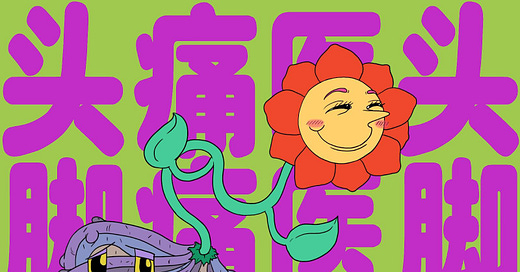Welcome to RealTime Mandarin—a multimedia resource to immerse you in the latest Chinese language trends, inspire you to practice and improve your Mandarin every week, and empower you to communicate with confidence.
Subscribe now to get the next issue straight to your inbox!
If you’ve been learning Chinese for some time, you probably know this idiom:
全力以赴 quánlì yǐfù - do everything in one’s power, or go all out to achieve something
It’s traced back to the Qing dynasty poet and historian, Zhào Yì 赵翼, from his most famous work, Notes on the Twenty-Two Dynastic Histories (二十二史札记 Èrshí'èr shǐ zhájì).
Nowadays, it’s often translated as ‘all-in’. It’s also one of those Chinese words where people sometimes just say the English instead:
你all in吗? Are you all-in?
我完完全全是All in的! Abso-f-ing-lutely!
‘All-in’ connects two news stories in China this week:
Netizen reactions to the Xi’An government’s so-called ‘all-in’ approach to lock-down policy.
A speech delivered by entrepreneur, Yú Mǐnhóng 俞敏洪, the founder of New Oriental, who is still ‘all-in’ despite losing $3 billion last year.
We dig into these two stories below, with some fantastic words and phrases to share, including interesting and creative references to the Ming and Qing dynasties as metaphors for what’s going on in China now.
Enjoy!
1. CONVERSATIONS WORTH CONSUMING
Too little too late in Xi’An
In an epidemic prevention and control press conference held in Xi'An on January 7th, an official from the municipal health administration updated on the ongoing efforts (in Chinese) to bring the COVID-19 outbreak in the city of 13 million people under control.
He apologised for mistakes made since the city went into lockdown on 23 December:
虽然西安市卫健委全力以赴,还是没有考虑周全,没能提供好充足的医疗保障服务,没有能够处理好疫情防控和群众看病就医需求的矛盾,对此,西安市卫健委深感愧疚,向全市人民致歉。
Although the Xi'an Municipal Health Commission has done everything it possibly can [‘all in’], it still failed to consider the overall situation thoroughly. We failed to provide adequate medical services; we failed to properly handle the tensions between epidemic prevention and control and the people's demand for medical treatment. Xi'an Municipal Health and Health Commission expresses its deep regret and apologises to the people of the city.
Useful words
The ‘all-in’ approach and the ‘apology’ were mocked on social media…
官帽 guānmào - ‘official hat’, derogatory term for government position
是全力以赴保官帽子,还是全力以赴在疫情中保障人民生命安全?Is it ‘all-in’ on protecting officials’ jobs, or is it ‘all-in’ on protecting people’s lives during a pandemic?
摘帽 zhāimào - ‘remove hat’, take the label of something away; here it means remove a local government official from their post
不对上负责,上面人会摘你帽子,下面人摘不了你的帽子!- If they don’t deliver on their promises to their political bosses, those bosses will get rid of them, but the people cannot remove these officials from their jobs.
诛心 zhūxīn - harsh words that reveal the truth about a hidden motive
说句诛心的话,长远看,这场疫情大考来的及时,筛出了不合格的地方和干部 - To put it bluntly, from a long-term perspective, the challenges brought about by the pandemic are a timely test that singled out some local governments and local-level leaders who are not qualified for the positions they hold.
乌纱帽 wūshāmào - ‘black gauze hat’, government official position (pejorative)
只有这样才能保住乌纱帽和不担一点责任 - This is the only way these officials can protect their jobs without taking any responsibility.
Background: This dates back to the Ming dynasty when government officials wore black gauze hats made of hemp. Different shaped hats would indicate differences in seniority.
黄泉政府 huángquán zhèngfǔ - government that caused a lot of suffering and even death
西安,一个罪孽至深的黄泉政府 - The Xi'An government is appalling.
Note: 黄泉 huángquán means where the dead are buried, or hell (阴间 yīnjiān).
Idioms
榆木脑袋 yúmù nǎodai - stupid
笑死了,这群榆木脑袋的官员 - Hilarious. These officials are so stupid.
草木皆兵 cǎomù jiēbīng - to mistake all the grass and trees as enemy soldiers; paranoid
领导脑子里就只有草木皆兵的一刀切 - There is a ‘one-size fits all’ approach with these paranoid officials.
Related: 一刀切 yīdāoqiē - one size fits all (see 24 July newsletter)
Related: same as 杯弓蛇影 bēigōng shéyǐng - ‘see a snake in the reflection of a bow in a cup’, paranoid
亡羊补牢,为时已晚 wángyáng bǔláo wéishí yǐwǎn - fixing the fence after the sheep has escaped; too little, too late
你现在这句话说的好像是你亡羊补牢为时不晚 - Saying this now is the same as trying to fix the fence after the sheep has escaped.
Note: Similar to the English idiom ‘shutting the gate after the horse has bolted’
Background: traced back to the Strategies of the Warring States (战国策 zhànguócè), an ancient Chinese text that contains anecdotes of political manipulation and warfare during the Warring States period (5th to 3rd centuries BC).
Related: 汽车撞墙了,你知道拐了 qìchē zhuàngqiángle, nǐ zhīdào guǎile - you know when to turn only after you’ve crashed into the wall





